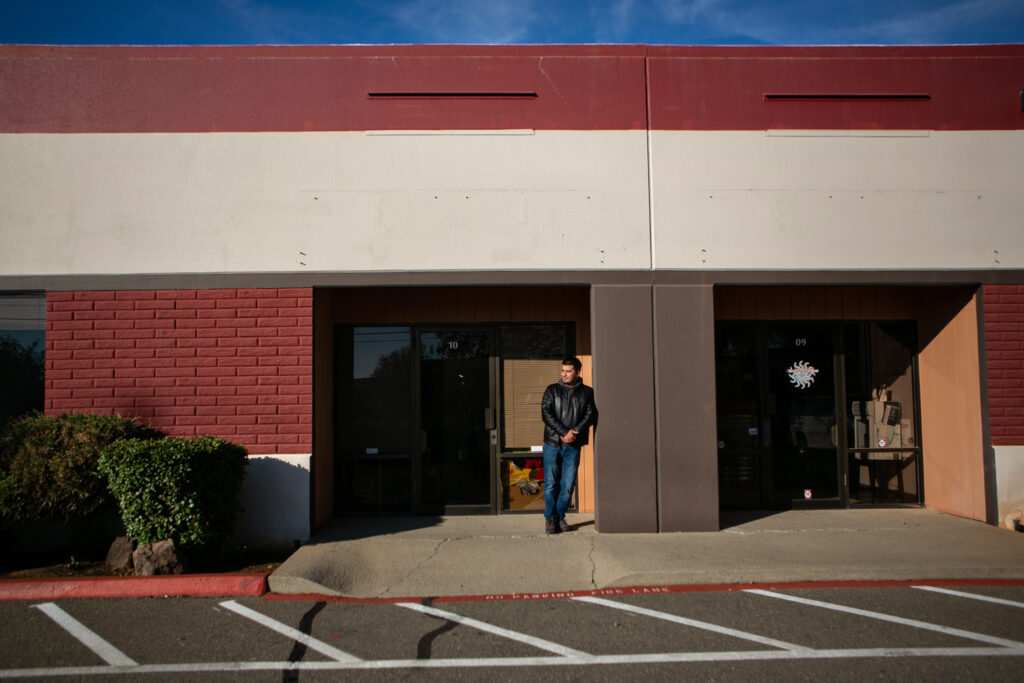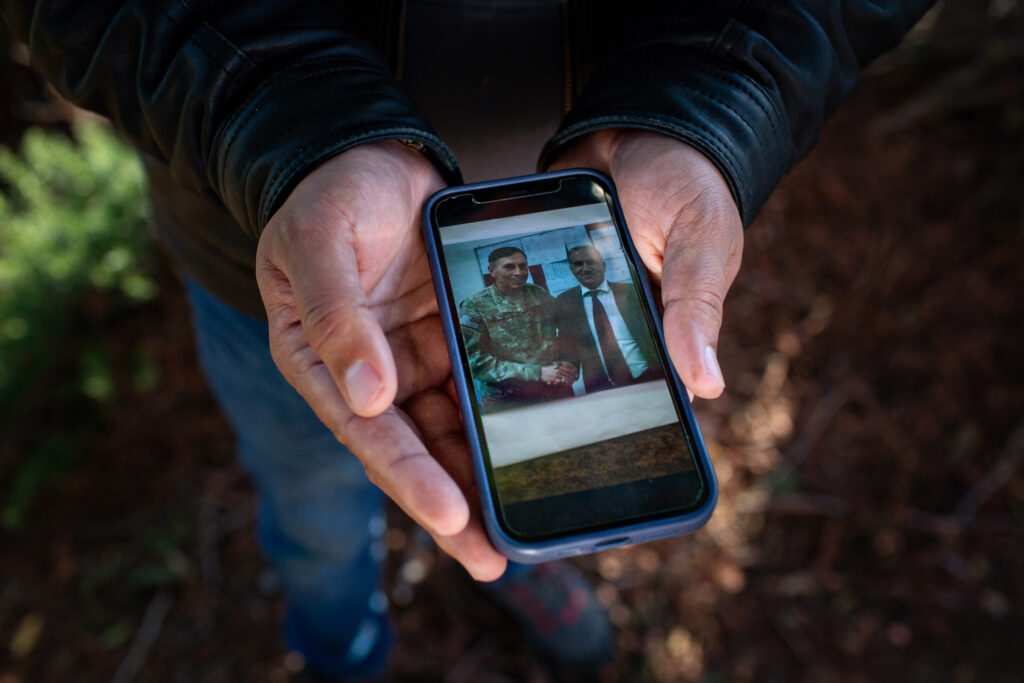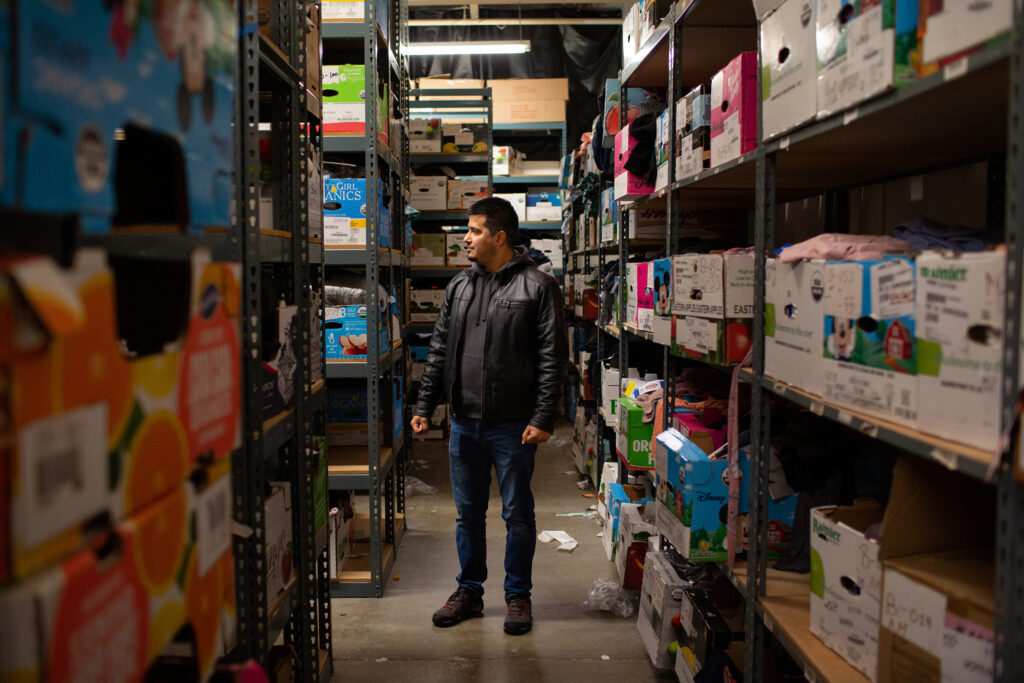Emal Salarzai woke up in the middle of the night a few weeks ago feeling as if his skull were burning, a heat so real he went to the mirror and began shaving off his hair.
“I was thinking about my mom and my dad,” he said, “I am the only son, the only child.”
Kabul had fallen two months earlier, and his parents were trapped in Afghanistan. They still are. The Taliban is searching for his father and two uncles, he said, all of whom helped the American regime — as did he, working with the U.S. military to train Afghan troops in English and computing. His mother, Masoma, 56, incapacitated by heart disease and diabetes, could not understand why others have been able to land coveted seats on outbound flights when they have not.

When Salarzai, 34, speaks with her sporadically on WhatsApp and Signal from Elk Grove, a suburb of Sacramento that is his home, she asks him why he hasn’t been able to help.
“Every time, these are her words,” said Salarzai. “When will we get out?”
He has no answers.
The United States evacuated more than 120,000 people before the withdrawal of U.S. troops in August and the staggeringly quick takeover by the Taliban, according to the U.S. Department of Homeland Security. Thousands of Afghan refugees included in those airlifts remain in “lily pad” third countries, where they are waiting in transit to final destinations. More than 70,000 have arrived in the United States, many still living on military bases.
But thousands of at-risk Afghans remain inside the country, increasingly desperate to leave as options for doing so dwindle, say family members and aid organizations. A handful are U.S. citizens or visa holders. Many more, like Salarzai’s parents, lack official status or documentation but are at risk either because of their own activities in the country, or because their relatives helped the United States.

A U.S. Department of State spokesperson said it has continued charter flights to facilitate departures for U.S. citizens and residents, and remains committed to the “monumental” task of helping vulnerable Afghans who want to leave. It has evacuated about 600 people since its official withdrawal at the end of August, the spokesperson said. The majority of flights out, though, are now handled through American allies such as Qatar, and nonprofit and aid agencies that charter their own planes, create their own manifests, and work to gather the necessary governmental clearances both through the U.S. and the new regime in Afghanistan. It is a slow and disjointed process.
The State Department said it is working to “accelerate” the pace of charter flights and has created a cross-agency group to streamline its effort. But the removal of the U.S. government and the scramble to fill the void by myriad smaller players have left confusion and frustration for Afghans. With no central command and no clear information on who is involved and how charter flights are being filled, those seeking ways out are left depending on tips from friends, internet information and luck, said Salarzai and others.
“It’s not as simple as it used to be … when there were Army planes and people were hopping on and they were taking off,” said Ismail Khan, a volunteer with nonprofit No One Left Behind, which helps special immigrant visa holders — those granted entry into the United States for helping troops as interpreters or other critical roles. “There are a lot of folks that you need to get their approval to get someone on a flight.”

Khan said that even with his connections through the nonprofit work, he is unable to get answers about his own family, who are also trapped in Afghanistan.
“There is not a follow-up,” he said. “You can’t get an answer from anyone that will tell you, ‘Hey, it’s going to happen in a month or two months or a year,’ or, ‘It’s not going to happen.’”
Recently, his 15-year-old brother was kidnapped and beaten by the Taliban, he said, freed after the family paid a ransom. Now, his family has split into four groups and is in hiding. But Khan fears that his high-profile work advocating for others will continue to make them targets. Like Salarzai’s family, they want to know why he can’t do more.
“The hardest part for me is I have been talking to senators and congressmen and news reporters and trying to do everything for others and my family as well,” Khan said. “My family, they call me every day and say, ‘Look, people are getting out and you are helping people get out and you are not helping us. What’s going on?’”
The pressure on those living in the United States to help family abroad is traumatizing Afghan communities — especially special immigrant visa recipients such as Salarzai and Khan who fear their families will die or be imprisoned if they fail to find a way out.
“I can guarantee you that everyone here already had PTSD and they are going through a mental issue right now,” Khan said. “I struggle at work. I can’t really focus. … It’s been a nightmare.”
Kerry Ham, executive director of World Relief Sacramento, a resettlement agency that works with Afghan refugees, said that mental health crisis is likely to grow. He receives multiple emails every day asking for help with evacuations, many from people who are refugees themselves and are just “getting up day by day, trying to figure out what they can do,” he said.
Last Thursday, Salarzai sat in the rented warehouse where he stores clothes to resell on Amazon. His dark eyes looked weary, his hair grown back to a short buzz. There were few lights on in the cluttered space, with boxes of shirts and shoes stacked to the ceiling. The room grew dim as the sun set on Veterans Day.
He was waiting for a call from his father but had no good news to give. He still had heard nothing back, except from a single source that was working to get his parents on a charter flight. The source said they needed to get passports first — theirs are expired.
But passports are hard to come by in Kabul, Salarzai said. Hundreds line up every day at the official office, now run by the Taliban. He is hesitant for his father to show up there, anyway.
Salarzai’s father worked as an intelligence liaison for the ousted regime and is known to his neighborhood as “Dagarwah” — the colonel — even though he is retired from military service. The family fled to Pakistan with nothing when the first Taliban regime took over. Salarzai was 4 and they lived in camps until his father could get established.
When the Taliban was toppled, they returned to a demolished Kabul. Salarzai was 14 and remembers coming through the Khyber Pass and seeing a soldier with a gun wearing traditional leather sandals instead of boots. It made him feel as though he was home.
He grew up in a Kabul that was rebuilding around him. One television station became dozens. There was music, and girls doing things. His female cousins went to school — one becoming a teacher and another a doctor. His uncles worked dangerous jobs in support of the government while his family rebuilt too. He helped the colonel build an eight-bedroom “villa” where their extended family lived together, the colonel taking his grandkids to school every day.
Salarzai rose through the ranks to become a trainer at the Morehead English Language Training Center, an elite school that prepped Afghan troops to travel to the U.S. and other countries for courses with special forces such as Army Rangers, he said.
On his phone, he keeps a photo of Canadian Lt. Col. Jean-Guy Levesque giving him the Book of Operating Procedures when Salarzai became site lead and supervisor of the school, the first Afghan to take control of the facility, in 2012. He loved the job, loved helping Afghanistan become a new country, he said.
But he began receiving threats, and worried about his kids. In 2015, he came to the United States on a special immigrant visa.
He tried to return to Afghanistan after only a few months in the U.S., missing his parents too much. His mother told him, “People are dying to just get out of this country, and you have a green card in your hand and you are saying you don’t want to leave. … Just go, and if [Allah] helps, we will be with you.”
Not long ago, members of the Taliban came to the door of the house where Salarzai’s grandfather and 8-year-old cousin were staying. They slapped the boy, he said, and demanded to know where the colonel was. Neighbors called the family to warn them.
“Just tell the colonel to not come home,” they said.
Salarzai and Khan both said they fear the Taliban will grow more bold as time passes and international interest wanes. They worry they will not be able to get their families out while there is still a slim window of opportunity.
“People are forgetting about them,” said Salarzai.
“There is this much hope,” he says, squeezing two fingers nearly to touching, “that is giving me strength.”
___
© 2021 Los Angeles Times Distributed by Tribune Content Agency, LLC



